BarCamp to Newspapers: You Need Us More Than We Need You
ABOVE: Conference organizer, Alex de Carvalho, interviewed at BarCamp 2009. Had I known he was such a superstar, I would have made a stronger attempt to interview him at last month’s BarCamp in Miami. But at the time, the name Chris Messina didn’t strike me as anything special. It turns out he is a king among social media strategists. An icon on the internet. A techno geek turned cyber stud. A man with a whopping 14,795 followers on Twitter. He even has his own Wikipedia page. And he is also one of the founders of BarCamp, which began as a spontaneous gathering of nerds in Palo Alto, California four years ago and has since turned into an international network of conferences focused on social networking, web applications, internet innovations and just about anything related to the World Wide Web.
ABOVE: BarCamp participants were encouraged to write down their ideas on Post-It notes and paste them on the white board in order to lead a presentation. On February 22, BarCamp was held in Miami for the third year in a row, attracting people from all over the globe to share ideas and learn new innovations and to socialize - in person - for a change. “It was a huge success,†said organizer Alex de Carvalho, one of Miami’s most prominent social media strategists. “We surpassed all expectations.†Alex rattled off the names of several cyber studs as I interviewed him during BarCamp, which was held in five rooms and one courtyard at the ritzy Mayfair Hotel and the Indian restaurant Anokha in Coconut Grove. None of the names rang a bell. “Chris Messina is here, Kevin Marks is here, David Recordon is here,†he said. I later found out these three men have more than 25,000 Twitter followers between them. I also found out that de Carvalho has more than 7,000 Twitter followers. In other words, when de Carvalho speaks, people listen. Or more accurately, when de Carvalho Tweets, people listen. Which is a good thing considering the local newspaper didn’t acknowledge BarCamp before, during and after the one-day conference. “All this was done through word of mouth using social networking sites like Twitter, Facebook and blogs,†he said.
ABOVE: John Carcutt of Wordpress leads a discussion on search engine optimization. Alex de Carvalho, who has organized all three Miami Barcamps since 2007, persuaded 38 companies to sponsor the event, ranging from small startups you’ve never heard of to internet bigwigs like Microsoft, Mozzila and Yahoo, which proves that although there is a certain underground air to BarCamp, there is also strong mainstream support. Except from the Herald, of course. “This was all done with absolutely no marketing budget,†he said. More than 600 people attended this year’s Barcamp, more than double the number of people who attended last year’s BarCamp and ten times the number of people who showed up to the very first Barcamp in Miami. “The Miami Herald covered that one but they haven’t covered it since,†he said. In fairness, the Herald covered the We Media conference later that week but made no mention of BarCamp nor any mention of Future of Web Aps conference also held that week. The Future of Web Aps and We Media were respectively held at the Arsht Center and the University of Miami, but they lacked the grassroots sentiment that makes Barcamp Miami so special. “This was all part of what we call ‘tech week’,†said Carvalho.
ABOVE: Kevin Marks of Google leads a presentation on open social containers. Even though they didn’t cover it, there were several Herald journalists at the function, including reporters and editors. “There were several people from the Herald at BarCamp but I guess they were there more for themselves and not to cover it,†said Greg Linch, a 21-year-old University of Miami student and editor of the school’s newspaper, The Miami Hurricane. As a former Miami Herald intern, Linch could probably teach them a thing or two about the future of journalism. “In general, many in the news industry are reluctant to take the steps that would move the industry forward,†he said. A perfect example is the Pulitzer Prize winning Herald columnist Leonard Pitts Jr. An extremely talented writer who apparently has a fear of innovation. He recently wrote a column belittling Twitter users, writing them off as petty and insignificant. But as Kyle Munzenrieder of the Miami New Times points out, not everybody has a syndicated soapbox to stand on each week, which is exactly what makes Twitter so appealing to so many people. And that is the point of Barcamp. That everybody stands on equal ground regardless of seniority, experience or even Twitter followers. BarCamp allows participants to simply walk up to a billboard and schedule a presentation they want to give, which totaled more than 65 presentations by the end of the day. “Nobody is scheduled in advanced at BarCamp, like they are at FOWA or We Media,†said Carvalho. “When you get there, there is a big whiteboard that is blank and anybody is free to write the topic they want to discuss.†“Nobody is guaranteed a slot, not even Chris Messina or Kevin Marks.†Another equalizing feature is that all sponsors pay the same $300 fee, no matter how large the company is. “It’s not like Microsoft is going to walk in there and pay $3,000 and get a guaranteed spot,†he said. One of the most popular presentations was lead by Jim Turner, a man with 6,287 Twitter followers who discussed “Blogging for a Living.†“Bloggers who become influential people can get approached by companies who hire them as bloggers,†said Turner, who was also broadcasting live through the internet during Barcamp to more than 200 listeners.
ABOVE: Jim Turner broadcasts to more than 200 people who were unable to attend this year’s BarCamp. He discussed how mom bloggers have been recruited by companies like Graco and Johnson and Johnson to promote or review their products. He even mentioned Thomas Hawk, a name I finally recognized. Hawk is the San Francisco photo blogger who showed me the power of the blogosphere after my 2007 arrest for photographing police against their wishes. He covered my story and even had called Miami police to acquire the arrest report. He was also one of the people who inspired me to start my own blog on photographers’ rights. Today, he frequently links to my blog which always result in a spike in traffic. Hawk, with 7,283 Twitter followers, is so ahead of the game that he is bored with Twitter. He is more of a Friendfeed fan. This is not to say that those attending BarCamp were all techno-savvy experts. Ron Norman, a 61-year-old retired truck driver who is in the process of launching a government watchdog blog called Miami Complaints, said he attended the Barcamp Miami to learn new innovations. “There has been way too much neglect at that level.†During this economic crisis, it is not surprising that one of the most popular presentations at Barcamp Miami was called “startup from scratch.†Speaking of startups, some of the best coverage of the Miami BarCamp came from an energetic duo who operate the site Go Live Miami. The site, which consists of videographer Richard Fendelman and host Jeile Marie, was launched last December and includes videos of Art Basel and the King Mango Strut Parade. “I learned that although Facebook, Twitter and Youtube are limitless vehicles to promote your website, meeting in person creates a different level of loyalty and fanbase,†said Marie, who acknowledged she didn’t know what a Tweet a few months ago. In fact, Jeile was able to double her Twitter followers from 90 to 201 through the people she met in Barcamp. And as I sit here with my measly 45 Twitter followers, I wonder what does Jeile have that I don’t have? Check out the video to find out… Follow Carlos Miller on Facebook, Twitter and Friendfeed.
You Deserve More Than an Ordinary Vacation.
Travel with Miami Beach 411 Today!
The Miami Beach 411 Travel Store is Open 24/7.
12 Comments on"BarCamp to Newspapers: You Need Us More Than We Need You"
|

Like what you see? Let's talk about how
we can help your vacation --> Contact Us |
|
Like what you see? Let's talk about
how we can help your vacation
--> Contact Us
how we can help your vacation
--> Contact Us







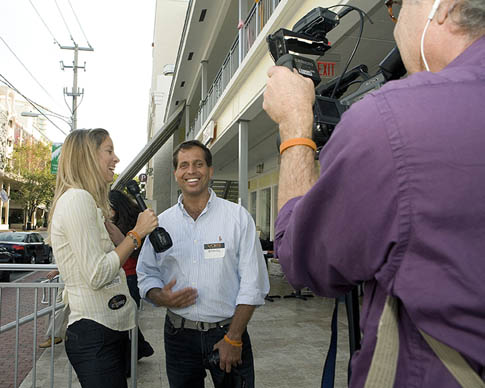
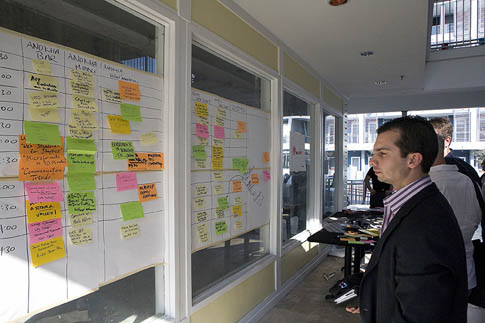
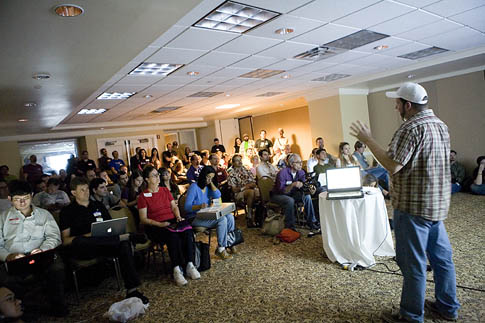
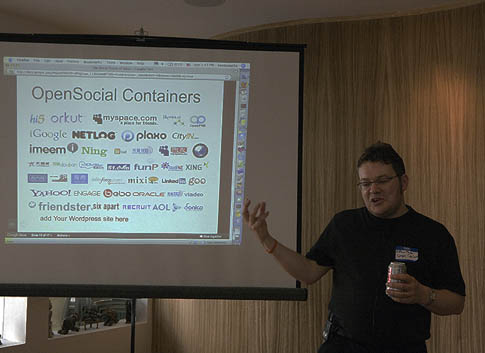
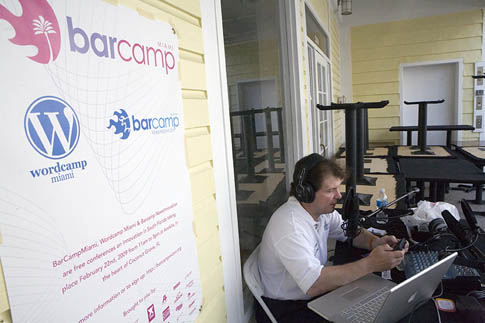








Brad A Schenck says:
Great article. Wish I could have been in town for BarCamp. But please let’s keep in mind Photography is a crime and its the job of the law to keep criminals like you away from law abiding citizens.
Posted on 03/06/2009 at 4:25 PM